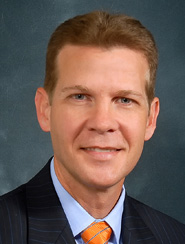
Heading toward what could be his final year in the state Legislature, Florida’s Senate leader said recent changes to the state’s newest parental choice program for special needs students should be made permanent.
Earlier this year, lawmakers expanded eligibility for the state’s brand-new Personal Learning Scholarship Accounts, which were passed with the backing of Senate President Andy Gardiner, R-Orlando.
Because those changes were made in legislation tied to the state budget, they’re set to expire over the summer if they aren’t renewed. The program in its second year has more than doubled in size, and Gardiner said parents are owed certainty about the program’s future.
“I think it should be a priority of this legislature and this governor to make that permanent in Florida statute,” he said during a meeting with Tallahassee reporters preparing for the upcoming legislative session. He added: “It’s time for a family to know that … they don’t have to worry every legislative session, is this potentially going to go away.”
Step Up For Students, which co-hosts this blog and employs the author of this post, helps administer the scholarship accounts.
Gardiner is expected to leave the Senate next year due to term limits. He is the father of a child with Down syndrome, and has pushed throughout his legislative career to create new opportunities for students with what he prefers to call unique abilities.
The Orlando Republican has previously backed legislation that broadened eligibility for McKay Scholarships, eliminated special diplomas and strengthened parents’ hand in negotiating individual education plans (IEPs) with school administrators.
This year, he said, there are a few items left on his agenda. He wants to improve the state’s information portal so that parents have “one-stop-shopping” to find resources for special needs children. Once those children finish high school, he said, their parents should be able to find higher-education and job-training opportunities in specialties that can work for their children. Lawmakers will also look for ways to beef up Florida’s Early Steps program and help people with special needs find jobs.
The goal, Gardiner said, is that as soon as a child receives a diagnosis of a unique ability, the parent will have tools to develop a “road map” through early learning options, K-12 and post-secondary education. Eventually, that map should lead to their children reaching their full potential.


